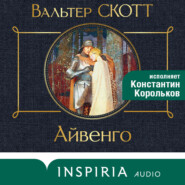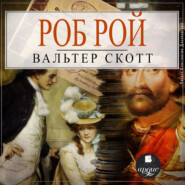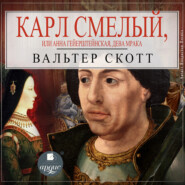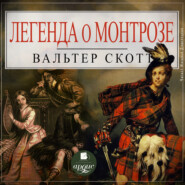По всем вопросам обращайтесь на: info@litportal.ru
(©) 2003-2024.
✖
The Fair Maid of Perth; Or, St. Valentine's Day
Настройки чтения
Размер шрифта
Высота строк
Поля
“My father’s son can best judge of that, old man. I have business to talk of with you and with my fair St. Catharine here, the loveliest and most obdurate saint in the calendar.”
“With deep reverence, my lord,” said the old man, “I would remind you that this is good St. Valentine’s Eve, which is no time for business, and that I can have your worshipful commands by a serving man as early as it pleases you to send them.”
“There is no time like the present,” said the persevering youth, whose rank seemed to be a kind which set him above ceremony. “I wish to know whether the buff doublet be finished which I commissioned some time since; and from you, pretty Catharine (here he sank his voice to a whisper), I desire to be informed whether your fair fingers have been employed upon it, agreeably to your promise? But I need not ask you, for my poor heart has felt the pang of each puncture that pierced the garment which was to cover it. Traitress, how wilt thou answer for thus tormenting the heart that loves thee so dearly?”
“Let me entreat you, my lord,” said Catharine, “to forego this wild talk: it becomes not you to speak thus, or me to listen. We are of poor rank but honest manners; and the presence of the father ought to protect the child from such expressions, even from your lordship.”
This she spoke so low, that neither her father nor Conachar could understand what she said.
“Well, tyrant,” answered the persevering gallant, “I will plague you no longer now, providing you will let me see you from your window tomorrow, when the sun first peeps over the eastern hills, and give me right to be your Valentine for the year.”
“Not so, my lord; my father but now told me that hawks, far less eagles, pair not with the humble linnet. Seek some court lady, to whom your favours will be honour; to me – your Highness must permit me to speak the plain truth – they can be nothing but disgrace.”
As they spoke thus, the party arrived at the gate of the church.
“Your lordship will, I trust, permit us here to take leave of you?” said her father. “I am well aware how little you will alter your pleasure for the pain and uneasiness you may give to such as us but, from the throng of attendants at the gate, your lordship may see that there are others in the church to whom even your gracious lordship must pay respect.”
“Yes – respect; and who pays any respect to me?” said the haughty young lord. “A miserable artisan and his daughter, too much honoured by my slightest notice, have the insolence to tell me that my notice dishonours them. Well, my princess of white doe skin and blue silk, I will teach you to rue this.”
As he murmured thus, the glover and his daughter entered the Dominican church, and their attendant, Conachar, in attempting to follow them closely, jostled, it may be not unwillingly, the young nobleman. The gallant, starting from his unpleasing reverie, and perhaps considering this as an intentional insult, seized on the young man by the breast, struck him, and threw him from him. His irritated opponent recovered himself with difficulty, and grasped towards his own side, as if seeking a sword or dagger in the place where it was usually worn; but finding none, he made a gesture of disappointed rage, and entered the church. During the few seconds he remained, the young nobleman stood with his arms folded on his breast, with a haughty smile, as if defying him to do his worst. When Conachar had entered the church, his opponent, adjusting his cloak yet closer about his face, made a private signal by holding up one of his gloves. He was instantly joined by two men, who, disguised like himself, had waited his motions at a little distance. They spoke together earnestly, after which the young nobleman retired in one direction, his friends or followers going off in another.
Simon Glover, before he entered the church, cast a look towards the group, but had taken his place among the congregation before they separated themselves. He knelt down with the air of a man who has something burdensome on his mind; but when the service was ended, he seemed free from anxiety, as one who had referred himself and his troubles to the disposal of Heaven. The ceremony of High Mass was performed with considerable solemnity, a number of noblemen and ladies of rank being present. Preparations had indeed been made for the reception of the good old King himself, but some of those infirmities to which he was subject had prevented Robert III from attending the service as was his wont. When the congregation were dismissed, the glover and his beautiful daughter lingered for some time, for the purpose of making their several shrifts in the confessionals, where the priests had taken their places for discharging that part of their duty. Thus it happened that the night had fallen dark, and the way was solitary, when they returned along the now deserted streets to their own dwelling.
Most persons had betaken themselves to home and to bed. They who still lingered in the street were night walkers or revellers, the idle and swaggering retainers of the haughty nobles, who were much wont to insult the peaceful passengers, relying on the impunity which their masters’ court favour was too apt to secure them.
It was, perhaps, in apprehension of mischief from some character of this kind that Conachar, stepping up to the glover, said, “Master, walk faster – we are dogg’d.”
“Dogg’d, sayest thou? By whom and by how many?”
“By one man muffled in his cloak, who follows us like our shadow.”
“Then will it never mend my pace along the Couvrefew Street for the best one man that ever trode it.”
“But he has arms,” said Conachar.
“And so have we, and hands, and legs, and feet. Why, sure, Conachar, you are not afraid of one man?”
“Afraid!” answered Conachar, indignant at the insinuation; “you shall soon know if I am afraid.”
“Now you are as far on the other side of the mark, thou foolish boy: thy temper has no middle course; there is no occasion to make a brawl, though we do not run. Walk thou before with Catharine, and I will take thy place. We cannot be exposed to danger so near home as we are.”
The glover fell behind accordingly, and certainly observed a person keep so close to them as, the time and place considered, justified some suspicion. When they crossed the street, he also crossed it, and when they advanced or slackened their pace, the stranger’s was in proportion accelerated or diminished. The matter would have been of very little consequence had Simon Glover been alone; but the beauty of his daughter might render her the object of some profligate scheme, in a country where the laws afforded such slight protection to those who had not the means to defend themselves.
Conachar and his fair charge having arrived on the threshold of their own apartment, which was opened to them by an old female servant, the burgher’s uneasiness was ended. Determined, however, to ascertain, if possible, whether there had been any cause for it, he called out to the man whose motions had occasioned the alarm, and who stood still, though he seemed to keep out of reach of the light. “Come, step forward, my friend, and do not play at bo peep; knowest thou not, that they who walk like phantoms in the dark are apt to encounter the conjuration of a quarterstaff? Step forward, I say, and show us thy shapes, man.”
“Why, so I can, Master Glover,” said one of the deepest voices that ever answered question. “I can show my shapes well enough, only I wish they could bear the light something better.”
“Body of me,” exclaimed Simon, “I should know that voice! And is it thou, in thy bodily person, Harry Gow? Nay, beshrew me if thou passest this door with dry lips. What, man, curfew has not rung yet, and if it had, it were no reason why it should part father and son. Come in, man; Dorothy shall get us something to eat, and we will jingle a can ere thou leave us. Come in, I say; my daughter Kate will be right glad to see thee.”
By this time he had pulled the person, whom he welcomed so cordially, into a sort of kitchen, which served also upon ordinary occasions the office of parlour. Its ornaments were trenchers of pewter, mixed with a silver cup or two, which, in the highest degree of cleanliness, occupied a range of shelves like those of a beauffet, popularly called “the bink.” A good fire, with the assistance of a blazing lamp, spread light and cheerfulness through the apartment, and a savoury smell of some victuals which Dorothy was preparing did not at all offend the unrefined noses of those whose appetite they were destined to satisfy.
Their unknown attendant now stood in full light among them, and though his appearance was neither dignified nor handsome, his face and figure were not only deserving of attention, but seemed in some manner to command it. He was rather below the middle stature, but the breadth of his shoulders, length and brawniness of his arms, and the muscular appearance of the whole man, argued a most unusual share of strength, and a frame kept in vigour by constant exercise. His legs were somewhat bent, but not in a manner which could be said to approach to deformity, on the contrary, which seemed to correspond to the strength of his frame, though it injured in some degree its symmetry.
His dress was of buff hide; and he wore in a belt around his waist a heavy broadsword, and a dirk or poniard, as if to defend his purse, which (burgher fashion) was attached to the same cincture. The head was well proportioned, round, close cropped, and curled thickly with black hair. There was daring and resolution in the dark eye, but the other features seemed to express a bashful timidity, mingled with good humor, and obvious satisfaction at meeting with his old friends.
Abstracted from the bashful expression, which was that of the moment, the forehead of Henry Gow, or Smith, for he was indifferently so called, was high and noble, but the lower part of the face was less happily formed. The mouth was large, and well furnished with a set of firm and beautiful teeth, the appearance of which corresponded with the air of personal health and muscular strength which the whole frame indicated. A short thick beard, and mustachios which had lately been arranged with some care, completed the picture. His age could not exceed eight and twenty.
The family appeared all well pleased with the unexpected appearance of an old friend. Simon Glover shook his hand again and again, Dorothy made her compliments, and Catharine herself offered freely her hand, which Henry held in his massive grasp, as if he designed to carry it to his lips, but, after a moment’s hesitation, desisted, from fear lest the freedom might be ill taken. Not that there was any resistance on the part of the little hand which lay passive in his grasp; but there was a smile mingled with the blush on her cheek, which seemed to increase the confusion of the gallant.
Her father, on his part, called out frankly, as he saw his friend’s hesitation: “Her lips, man – her lips! and that’s a proffer I would not make to every one who crosses my threshold. But, by good St. Valentine, whose holyday will dawn tomorrow, I am so glad to see thee in the bonny city of Perth again that it would be hard to tell the thing I could refuse thee.”
The smith, for, as has been said, such was the craft of this sturdy artisan, was encouraged modestly to salute the Fair Maid, who yielded the courtesy with a smile of affection that might have become a sister, saying, at the same time: “Let me hope that I welcome back to Perth a repentant and amended man.”
He held her hand as if about to answer, then suddenly, as one who lost courage at the moment, relinquished his grasp; and drawing back as if afraid of what he had done, his dark countenance glowing with bashfulness, mixed with delight, he sat down by the fire on the opposite side from that which Catharine occupied.
“Come, Dorothy, speed thee with the food, old woman; and Conachar – where is Conachar?”
“He is gone to bed, sir, with a headache,” said Catharine, in a hesitating voice.
“Go, call him, Dorothy,” said the old glover; “I will not be used thus by him: his Highland blood, forsooth, is too gentle to lay a trencher or spread a napkin, and he expects to enter our ancient and honourable craft without duly waiting and tending upon his master and teacher in all matters of lawful obedience. Go, call him, I say; I will not be thus neglected.”
Dorothy was presently heard screaming upstairs, or more probably up a ladder, to the cock loft, to which the recusant apprentice had made an untimely retreat; a muttered answer was returned, and soon after Conachar appeared in the eating apartment. There was a gloom of deep sullenness on his haughty, though handsome, features, and as he proceeded to spread the board, and arrange the trenchers, with salt, spices, and other condiments – to discharge, in short, the duties of a modern domestic, which the custom of the time imposed upon all apprentices – he was obviously disgusted and indignant with the mean office imposed upon him.
The Fair Maid of Perth looked with some anxiety at him, as if apprehensive that his evident sullenness might increase her father’s displeasure; but it was not till her eyes had sought out his for a second time that Conachar condescended to veil his dissatisfaction, and throw a greater appearance of willingness and submission into the services which he was performing.
And here we must acquaint our reader that, though the private interchange of looks betwixt Catharine Glover and the young mountaineer indicated some interest on the part of the former in the conduct of the latter, it would have puzzled the strictest observer to discover whether that feeling exceeded in degree what might have been felt by a young person towards a friend and inmate of the same age, with whom she had lived on habits of intimacy.
“Thou hast had a long journey, son Henry,” said Glover, who had always used that affectionate style of speech, though no ways akin to the young artisan; “ay, and hast seen many a river besides Tay, and many a fair bigging besides St. Johnston.”
“But none that I like half so well, and none that are half so much worth my liking,” answered the smith. “I promise you, father, that, when I crossed the Wicks of Baiglie, and saw the bonny city lie stretched fairly before me like a fairy queen in romance, whom the knight finds asleep among a wilderness of flowers, I felt even as a bird when it folds its wearied wings to stoop down on its own nest.”
“Aha! so thou canst play the maker [old Scottish for poet] yet?” said the glover. “What, shall we have our ballets and our roundels again? our lusty carols for Christmas, and our mirthful springs to trip it round the maypole?”
“Such toys there may be forthcoming, father,” said Henry Smith, “though the blast of the bellows and the clatter of the anvil make but coarse company to lays of minstrelsy; but I can afford them no better, since I must mend my fortune, though I mar my verses.”
“Right again – my own son just,” answered the glover; “and I trust thou hast made a saving voyage of it?”
“Nay, I made a thriving one, father: I sold the steel habergeon that you wot of for four hundred marks to the English Warden of the East Marches, Sir Magnus Redman. He scarce scrupled a penny after I gave him leave to try a sword dint upon it. The beggardly Highland thief who bespoke it boggled at half the sum, though it had cost me a year’s labour.”
“What dost thou start at, Conachar?” said Simon, addressing himself, by way of parenthesis, to the mountain disciple; “wilt thou never learn to mind thy own business, without listening to what is passing round thee? What is it to thee that an Englishman thinks that cheap which a Scottishman may hold dear?”
Conachar turned round to speak, but, after a moment’s consideration, looked down, and endeavoured to recover his composure, which had been deranged by the contemptuous manner in which the smith had spoken of his Highland customer.
Henry went on without paying any attention to him. “I sold at high prices some swords and whingers when I was at Edinburgh. They expect war there; and if it please God to send it, my merchandise will be worth its price. St. Dunstan make us thankful, for he was of our craft. In short, this fellow (laying his hand on his purse); who, thou knowest, father, was somewhat lank and low in condition when I set out four months since, is now as round and full as a six weeks’ porker.”
“And that other leathern sheathed, iron hilted fellow who hangs beside him,” said the glover, “has he been idle all this while? Come, jolly smith, confess the truth – how many brawls hast thou had since crossing the Tay?”
“Nay, now you do me wrong, father, to ask me such a question (glancing a look at Catharine) in such a presence,” answered the armourer: “I make swords, indeed, but I leave it to other people to use them. No – no, seldom have I a naked sword in my fist, save when I am turning them on the anvil or grindstone; and they slandered me to your daughter Catharine, that led her to suspect the quietest burgess in Perth of being a brawler. I wish the best of them would dare say such a word at the Hill of Kinnoul, and never a man on the green but he and I.”

















